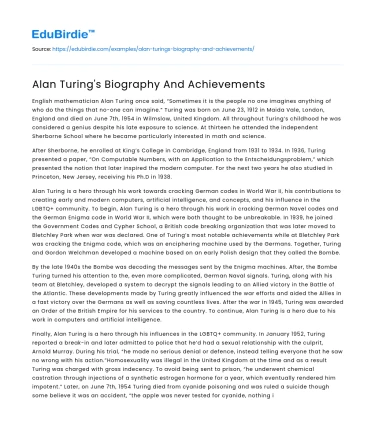English mathematician Alan Turing once said, “Sometimes it is the people no one imagines anything of who do the things that no-one can imagine.” Turing was born on June 23, 1912 in Maida Vale, London, England and died on June 7th, 1954 in Wilmslow, United Kingdom. All throughout Turing’s childhood he was considered a genius despite his late exposure to science. At thirteen he attended the independent Sherborne School where he became particularly interested in math and science.
After Sherborne, he enrolled at King’s College in Cambridge, England from 1931 to 1934. In 1936, Turing presented a paper, “On Computable Numbers, with an Application to the Entscheidungsproblem,” which presented the notion that later inspired the modern computer. For the next two years he also studied in Princeton, New Jersey, receiving his Ph.D in 1938.
Save your time!
We can take care of your essay
- Proper editing and formatting
- Free revision, title page, and bibliography
- Flexible prices and money-back guarantee
Alan Turing is a hero through his work towards cracking German codes in World War II, his contributions to creating early and modern computers, artificial intelligence, and concepts, and his influence in the LGBTQ+ community. To begin, Alan Turing is a hero through his work in cracking German Navel codes and the German Enigma code in World War II, which were both thought to be unbreakable. In 1939, he joined the Government Codes and Cypher School, a British code breaking organization that was later moved to Bletchley Park when war was declared. One of Turing’s most notable achievements while at Bletchley Park was cracking the Enigma code, which was an enciphering machine used by the Germans. Together, Turing and Gordon Welchman developed a machine based on an early Polish design that they called the Bombe.
By the late 1940s the Bombe was decoding the messages sent by the Enigma machines. After, the Bombe Turing turned his attention to the, even more complicated, German Naval signals. Turing, along with his team at Bletchley, developed a system to decrypt the signals leading to an Allied victory in the Battle of the Atlantic. These developments made by Turing greatly influenced the war efforts and aided the Allies in a fast victory over the Germans as well as saving countless lives. After the war in 1945, Turing was awarded an Order of the British Empire for his services to the country. To continue, Alan Turing is a hero due to his work in computers and artificial intelligence.
Finally, Alan Turing is a hero through his influences in the LGBTQ+ community. In January 1952, Turing reported a break-in and later admitted to police that he’d had a sexual relationship with the culprit, Arnold Murray. During his trial, “he made no serious denial or defence, instead telling everyone that he saw no wrong with his action.”Homosexuality was illegal in the United Kingdom at the time and as a result Turing was charged with gross indecency. To avoid being sent to prison, “he underwent chemical castration through injections of a synthetic estrogen hormone for a year, which eventually rendered him impotent.” Later, on June 7th, 1954 Turing died from cyanide poisoning and was ruled a suicide though some believe it was an accident, “the apple was never tested for cyanide, nothing in the accounts of Turing’s last days suggested he was suicidal and Turing had cyanide in his house for chemical experiments he conducted in his spare room.”
It wasn’t until many years after his death,on September 10, 2009, that a petition started by John Graham-Cumming convinced the then-Prime Minister Gordon Brown to release an apology on behalf of the British government to Turing for prosecuting him as a homosexual. The recognition that Alan Turing is one of Britain’s most famous victims of homophobia is one more step towards equality. Later in 2013, Queen Elizabeth II granted Turing a royal pardon and then on October 20, 2016 the British government announced “Turing’s Law” which pardoned thousands of gay and bisexual men who were condemed for homosexual acts when it was a crime.






 Stuck on your essay?
Stuck on your essay?

